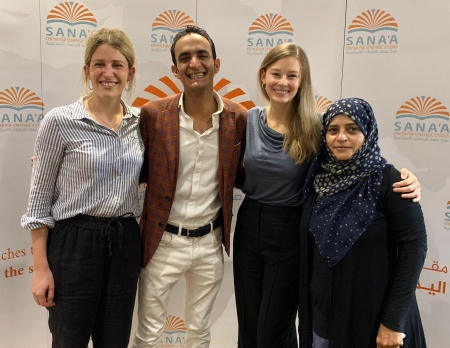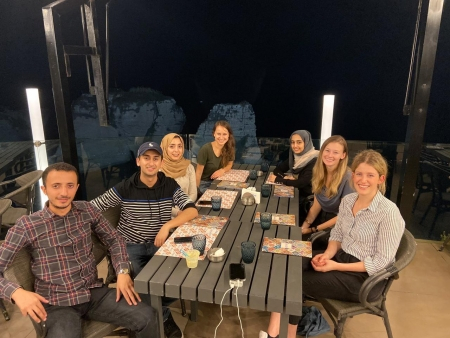Human Rights Clinic Students Attend Yemeni-Led Expert Training on the War in Yemen
November 15, 2019 – Last month, two students from the Columbia Law School Human Rights Clinic, Clare Skinner (LL.M. ’20) and Ellie Dupler (J.D. ’20), traveled to Beirut, Lebanon, with Clinic Director, Professor Sarah Knuckey, to join 35 diplomats, academics, journalists, and NGO representatives for an intensive course on the causes and effects of the conflict in Yemen as well as current prospects for peace. The students attended as part of Human Rights Clinic advocacy work on Yemen, which involves working with Yemeni partners to study the mental health crisis in Yemen and advocate for reform.
“Given the incredibly complex dynamics in Yemen and sheer number of international and national actors involved, it is difficult to comprehend the conflict and to get current, accurate information about what is happening on the ground,” said Skinner, an Australian LL.M with a background in public interest law and commissions of inquiry. “The opportunity to attend this training and hear directly from key Yemeni actors was invaluable, and an unparalleled learning experience.”

Clare Skinner, Sana'a Center Co-Founder and Chairman Farea al-Muslimi, Ellie Dupler, and Dr. Fawziah al-Ammar
The expert workshop was conducted by the Sana’a Center for Strategic Studies, an independent research and policy think-tank based in Yemen. As the conflict in Yemen enters its fifth year, the training was timely opportunity to not only reflect on the complex historical background to the conflict, but also to get unique access to current analysis. A diverse range of Yemeni speakers and foreign experts shared their expertise.
Executive Director of the Sana’a Center, Maged Al-Madhaji, said that the exchange is one of the center’s most important projects. “It provides a platform for Yemeni voices and facilitates the dissemination of accurate information on the country as well as shaping the narratives on Yemen on all levels.”
Over 30 speakers were invited to shed light on the conflict—including senior representatives of local parties to the conflict, government officials, former presidents and ministers, tribal leaders, economic, political, and security experts, artists, and journalists—and participants had the opportunity to engage in dialogue with speakers. Major topics included Yemeni socio-political dynamics, including current events taking place in underreported governorates such as Al-Mahra and Shabwa, as well as the war economy in Yemen and possible scenarios and outcomes of the recent Riyadh Agreement. Other topics included the experiences of minorities in Yemen, the role of poetry in the AQAP and ISIS in Yemen, the Houthi movement and Zaidism, recent economic and humanitarian developments, prospects for peace, the human rights situation, and security threats posed by armed groups.
“The training complemented ongoing work between the Sana’a Center and the Human Rights Clinic to conduct urgently-needed research on the mental health situation in Yemen,” said Dupler, who has previously researched the intersection of mental health and intimate partner violence in Jordan and Nepal. “Hearing from so many perspectives on issues that directly affect the right to mental health in Yemen, as well as other intersecting human rights, will enrich our research with Sana’a Center on the different kinds of trauma exposure in Yemen, the effects on the population, and local needs and coping strategies.”

Dupler and Skinner at dinner with Sana'a Center staff
The Sana’a Center, Columbia Law School Human Rights Clinic, and the Mailman School of Public Health have partnered to conduct research on the magnitude of psychological distress in Yemen, and to push for improvements in how the Government of Yemen and the international community respond to the acute mental health needs of Yemenis. In a 2017 briefing paper – The Impact of War on Mental Health in Yemen: A Neglected Crisis – the groups revealed how serious the risk to mental health is in Yemen. Despite this, mental health services in Yemen continue to be few, and there is little research on the effects of the war on the mental health of the population. This year, the Sana’a Center and Columbia continue to seek to advance the right to mental health in Yemen through interdisciplinary research and human rights advocacy, in order to bring attention to the many ways that the war is impacting the right to mental health as well as how poor mental health may impact peace efforts and transitional processes.
# # #
The Human Rights Clinic works to advance human rights through partnerships with civil society organizations and communities. It brings together innovative education, social justice work, and scholarly research, and students are trained to be strategic human rights advocates.
The Sana’a Center for Strategic Studies is an independent think-tank that seeks to foster change through knowledge production with a focus on Yemen and the surrounding region. The Center’s publications and programs, offered in both Arabic and English, cover political, social, economic and security-related developments, aiming to impact policy locally, regionally, and internationally.
